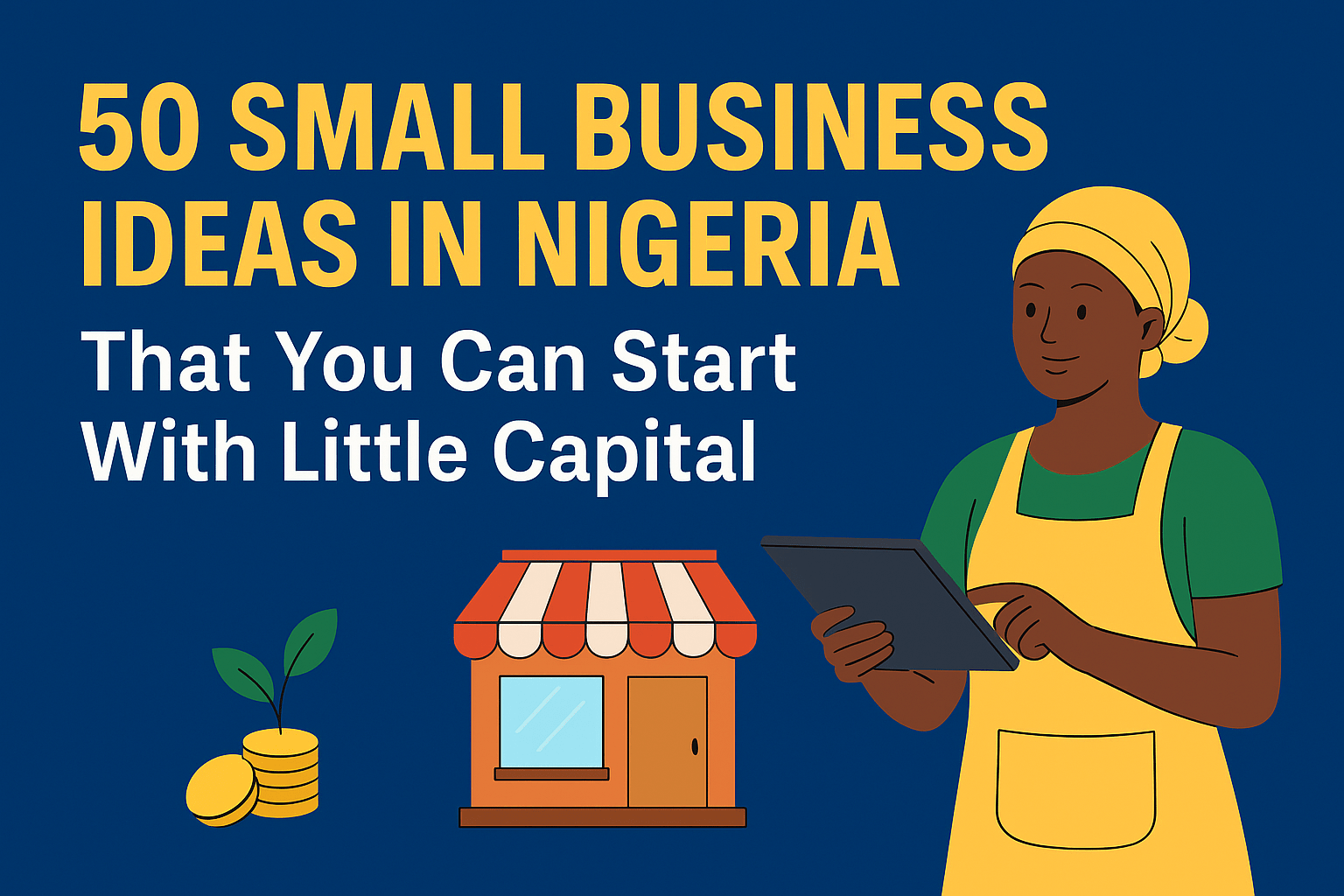10. Frequently Asked Questions (FAQs)
1. What business can I start with 100k in Nigeria in 2025?
Starting a profitable business in Nigeria does not always require millions of naira. With as little as ₦100,000, there are several low-capital businesses that can generate good income if managed well. In 2025, due to inflation and rising costs, one must be strategic, but opportunities still abound.
Some of the most profitable small businesses under 100k include:
-
POS and Mobile Money Agent Business: This is one of the fastest-growing ventures in Nigeria. With ₦50,000–₦100,000, you can buy a POS machine, register with a fintech provider, and start offering withdrawal, deposit, and bill payment services. Because Nigerians often need quick access to cash and banking services, the demand is very high.
-
Foodstuff Retailing: Food is a necessity, and selling items like rice, beans, yam, garri, palm oil, and packaged pepper can generate steady daily income. You can start small in your neighborhood with ₦100,000 and reinvest profits to expand.
-
Mini Importation Business: Many Nigerians are making money by importing affordable products such as phone accessories, clothes, and household items from China or Turkey. With ₦100,000, you can start sourcing products online and selling them on platforms like Jumia, Konga, or via social media.
-
Poultry or Catfish Farming (Small Scale): With 100k, you can rear a small number of birds or start a catfish pond on a modest scale. These agribusinesses are profitable if properly managed, as the demand for chicken, eggs, and fish is always high.
-
Mobile Food Vending: Preparing popular meals such as jollof rice, beans, yam, and snacks for office workers or students can be profitable. You don’t need a big restaurant—just a clean spot or delivery model to reach customers.
The key to success is to choose a business that matches your skills and location, keep your costs lean, and reinvest profits into growth. Many big businesses in Nigeria today started with less than ₦100,000.
2. Which small business is most profitable in Nigeria?
The most profitable business in Nigeria depends on three things: market demand, startup capital, and your business skills. However, based on consumer behavior and economic trends in 2025, some businesses stand out as highly profitable:
-
Agriculture & Food Processing: Nigerians spend a huge percentage of their income on food. Ventures like poultry farming, fish farming, foodstuff distribution, and food packaging remain very profitable.
-
Logistics & Delivery Services: With the rise of e-commerce and social media sales, delivery services are in high demand. Even a single motorcycle can fetch daily income if managed well.
-
POS & Fintech Agency Banking: As banking systems remain stressful and ATMs are often crowded, Nigerians prefer using POS agents. This business is very profitable with low overhead.
-
Fashion & Beauty Industry: Nigerians love fashion. Tailoring, clothing sales, wig production, and cosmetics businesses are highly lucrative.
-
Renewable Energy (Solar Business): With power supply challenges, selling or installing solar panels and inverters is becoming one of the most profitable small businesses in Nigeria.
While profit potential is important, execution and consistency are the real keys. Even a “small” venture can become highly profitable if managed well, marketed aggressively, and adapted to customer needs.
3. How can I fund my small business without a loan?
Not every entrepreneur wants to start with loans, and the good news is that there are many loan-free funding options for small businesses in Nigeria:
-
Personal Savings: Start with what you have, even if it’s small. Many successful entrepreneurs began by saving gradually until they had enough to launch.
-
Family and Friends: Trusted relatives and close friends may support you financially if they see your seriousness and a clear plan.
-
Partnerships: Partner with someone who has the resources you lack. For example, if you have the business skills but not the capital, partner with someone who can invest while you manage operations.
-
Cooperative Societies & Thrift Savings (Esusu, Ajo, Adashe): Join a cooperative where members contribute and rotate funds. This traditional system remains a powerful way to raise capital without loans.
-
Grants & Competitions: Organizations like the Tony Elumelu Foundation (TEF), Bank of Industry, and government empowerment schemes often provide grants and business support. You don’t pay these back.
-
Crowdfunding Platforms: In 2025, digital crowdfunding is becoming more popular in Nigeria. Platforms allow you to raise money from many people online to support your idea.
The secret is to be creative, resourceful, and trustworthy. Once people believe in your idea and see your commitment, they are more likely to support you without expecting loan repayments.
4. What skills do I need to run a successful business?
Running a profitable business in Nigeria requires more than just money. You need the right set of entrepreneurial skills, including:
-
Financial Management: Ability to track income, expenses, and profits effectively. Poor financial habits kill many small businesses.
-
Marketing & Sales Skills: You must know how to attract customers, promote your products, and close sales.
-
Digital Literacy: In 2025, online presence is non-negotiable. Skills in social media, SEO, WhatsApp Business, and e-commerce will give you an edge.
-
Customer Service: Nigerians value respect and quick service. Treat customers well, and they will return and recommend you to others.
-
Problem-Solving & Adaptability: Nigeria’s business environment is unpredictable. You must be flexible and ready to adjust to challenges like inflation, fuel scarcity, or government policies.
-
Leadership & People Management: Even if you start alone, you may eventually employ staff. Good leadership helps you get the best out of your team.
These skills can be learned and developed over time. The more you invest in personal growth, the higher your chances of long-term success.
5. How long before a small business becomes profitable?
There is no one-size-fits-all answer, as profitability depends on the type of business, startup capital, and how efficiently it is run. However, generally:
-
Retail Businesses (e.g., POS, foodstuff, mobile money): These can start generating profit within weeks to 3 months because demand is immediate.
-
Agriculture (e.g., poultry, fish farming): These often take 3–9 months depending on the farming cycle before profits show.
-
Service Businesses (e.g., tutoring, logistics, digital services): Profitability can come in 2–6 months, depending on how quickly you attract clients.
-
Production/Manufacturing: This sector may take 6–18 months before full profitability, as initial investments in equipment and materials are higher.
A critical factor is reinventing profits into the business. Too many Nigerian entrepreneurs eat their profits too early. The most successful small businesses often reinvest for at least the first year before pulling out significant personal income.
The key takeaway is patience and consistency. With proper planning, effective marketing, and financial discipline, most small businesses in Nigeria can become profitable within 6–12 months.



